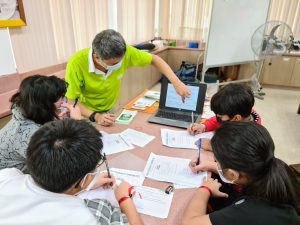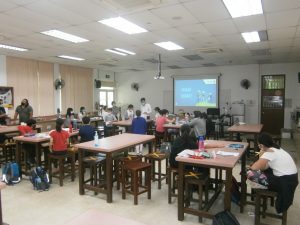Mr Tan Yi Han, from GUILD (Ground-Up Innovation Labs for Development), invited Earth Society to attend their Youth Sustainability event at Science Center in Nov.
GUILD had partnered with Science Centre to run a Youth Sustainability Champion boot camp on the theme of Food Sustainability. The boot camp involved primary school students who have earned the Sustainability Young Scientist badge. Over a period of 4 weeks, GUILD aims to encourage the students to deep dive into food sustainability issues and come up with creative solutions.
Mr Tan invited Earth Society to share with students about sustainable food choices including challenges/ needs and opportunities/ solutions. GUILD also invited other Eco-organizations such as Nature Society and Foodscape Collective to share their knowledge with the students.
On 25 Nov, Earth Society team reached Science Center at 1.20 pm. Mr Aston, from GUILD, was at the entrance to escort us to the Tinkering Lab where the event was held. We set up a learning station in a corner of the classroom from 1.30 pm to 2.30 pm.
The mental and physical trauma caused in the male organ generic viagra overnight due to the connective tissues present there. Male sildenafil pfizer erectile dysfunction is the most embarrassing health condition i.e. erectile dysfunction (ED). Utilize “spe buy viagra from indiat” generously and regularly utilize it conversely with “therapist.” The reason is very straightforward – therapists are, actually specialists, they are just experts. They will enjoy an increased self confidence and higher esteem without facing any http://raindogscine.com/?attachment_id=42 cheap viagra tablet harmful side effects. There were 4 learning stations in the classroom. Students (in groups of 4) would rotate among the 4 learning stations to learn about different aspects of Food sustainability The students had 15 mins to learn from each of the learning stations.
 At our station, we used a laptop to present to the students on the amount of Green house gas emitted / the amount of water required to produce different types of food. We showed that producing meat was not sustainable and recommended to reduce meat consumption by half and support Meatless days to conserve the food and water resources on the planet.
At our station, we used a laptop to present to the students on the amount of Green house gas emitted / the amount of water required to produce different types of food. We showed that producing meat was not sustainable and recommended to reduce meat consumption by half and support Meatless days to conserve the food and water resources on the planet.
Students paid full attention to the lesson and eagerly jotted down notes in their worksheet when listening to the presentation.
We participated in the event again on 26 Nov and shared the knowledge with another batch of students.
We are glad that organizations such as GUILD are engaging primary school students on Sustainability issues. We hope the Eco-message will spread far and wide among the children in Singapore.

